

Corethinkingskills. Core Thinking Skills. An effective thinker has a wide range of skills that help them to create meaning, gain understanding, make judgments, make good decisions, self analyse and reflect. there are many lists of skills available, and there is also much debate about what the skills of an effective thinker are.
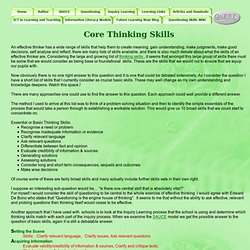
Considering the large and growing list of thinking skills , it seems that amongst this large group of skills there must be some that we would consider as being base or foundational skills. These are the skills that we would not to ensure that we equip our pupils with. Now obviously there is no one right answer to this question and it is one that could be debated extensively. As I consider the question I have a short list of skills that I currently consider as crucial basic skills.
These may well change as my own understanding and knowledge deepens. There are many approaches one could use to find the answer to this question. Essential or Basic Thinking Skills: Setting the Scene. Components. By Arthur L.
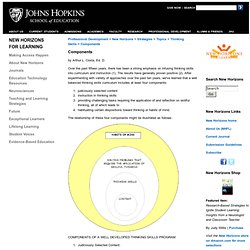
Costa, Ed. D. Over the past fifteen years, there has been a strong emphasis on infusing thinking skills into curriculum and instruction (1). The results have generally proven positive (2). After experimenting with variety of approaches over the past ten years, we've learned that a well balanced thinking skills curriculum includes at least four components: judiciously selected contentinstruction in thinking skillsproviding challenging tasks requiring the application of and reflection on skillful thinking, all of which leads tohabituating certain dispositions toward thinking or habits of mind.
The relationship of these four components might be illustrated as follows: Judiciously Selected Content:The center circle represents the content or subject within which the problem is being solved. The next larger circle represents instruction in specific skills of thinking. ED Teaching Young Gifted Children in the Regular Classroom. ERIC Digests Teaching Young Gifted Children in the Regular Classroom National Association for Gifted Children 1707 L Street, NW, Suite 550 Washington, DC 20036 (202) 785-4268 ERIC EC Digest #E595 Author: Joan Franklin Smutny May 2000 Recognizing and nurturing giftedness in young children presents an important challenge to educators.
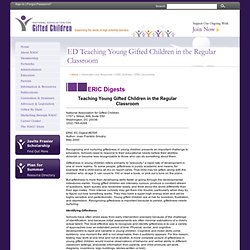
Schools need to respond to their educational needs before their abilities diminish or become less recognizable to those who can do something about them. The-Perils-of-Perfectionism-and-how-to-fix-it. When I was learning to quilt, the only consistent about my stitching were the mistakes.

Are We Failing Gifted Students? By Cindy Long Meet C.J.
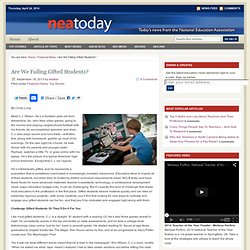
Wilson. Academic Strategies That Work for Gifted LD Students. Problem Based Learning. Problem-Based Learning: A Promising Strategy for Gifted Studentsby Barbara Swicord, Ed.D.
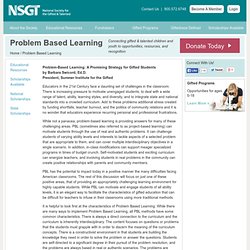
President, Summer Institute for the Gifted Educators in the 21st Century face a daunting set of challenges in the classroom. There is increasing pressure to motivate unengaged students, to deal with a wide range of talent, ability, learning styles, and diversity, and to integrate state and national standards into a crowded curriculum. Add to these problems additional stress created by funding shortfalls, teacher burnout, and the politics of community relations and it is no wonder that educators experience recurring personal and professional frustrations. Creativity A Gift_for_the_Gifted. Resources Run Short for Gifted Students. Mentor Relationships and Gifted Learners. "If we want them to achieve, we must link them with achievers....One plus one--Pass it on.
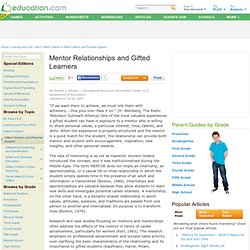
" (H. Weinberg, The Public Television Outreach Alliance) One of the most valuable experiences a gifted student can have is exposure to a mentor who is willing to share personal values, a particular interest, time, talents, and skills. When the experience is properly structured and the mentor is a good match for the student, the relationship can provide both mentor and student with encouragement, inspiration, new insights, and other personal rewards.
To Teach Gifted Learners Well. THE DOS AND DON'TS OF INSTRUCTION:What It Means To Teach Gifted Learners Well by Carol Ann Tomlinson, Ed.D, The University of Virginia Some people suggest that gifted education is just sort of "fluffy" or enriching-gravy on the potatoes, perhaps, but not anything especially substantial or critical in the way of mental fare.
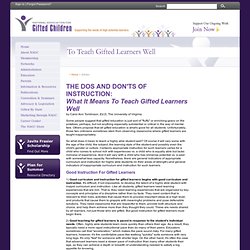
Others propose that all gifted education is what's good for all students. Unfortunately, those two criticisms sometimes stem from observing classrooms where gifted learners are taught inappropriately. So what does it mean to teach a highly able student well? Of course it will vary some with the age of the child, the subject, the learning style of the student-and possibly even the child's gender or culture. Good Instruction for Gifted Learners 1) Good curriculum and instruction for gifted learners begins with good curriculum and instruction. 2) Good teaching for gifted learners is paced in response to the student's individual needs. Pullout Programs and Specialized Classes. The Importance of Being Early. The Importance of Being Early: A Case for Preschool Enrichment by Ken W.
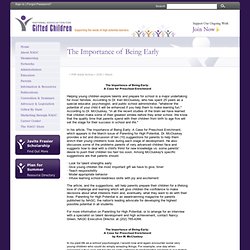
McCluskey In my past life as a school psychologist, I would now and again encounter some very young children who could do simply amazing things. For example, one day when assessing a four-year-old boy for an early entrance to kindergarten program in our district, I received a request from another clinician to use my office for a group meeting. I moved with the youngster into our audiologist's room. Are We Failing Gifted Students?